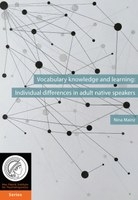Variation in vocabulary – The learning, knowledge, and processing of words

Vocabulary and language processing
Knowing the words of a language is an essential aspect of an individual’s command of their language. The native speakers of a language have been shown to vary considerably in their vocabulary size. Variation in vocabulary, in turn, has been related to differences in language processing. Nina Mainz’s research confirmed previous studies and demonstrated that individuals with larger vocabularies are faster and more accurate in recognising and producing words. This was true not only for the typical participants in psycholinguistic research, namely university students, but also for individuals from more diverse backgrounds. Although the results showed overall the same pattern of the relationship between vocabulary and language processing, there were subtle differences between the typical and the more diverse group of participants. These findings demonstrate the importance of testing not only university students but also participants from more diverse educational backgrounds.
Word learning
But why do some people learn more words than others, thus, end up having larger vocabularies than others? Despite the fact that word learning undeniably continues across the life span, little is known about which factors affect native language word learning in adulthood. A word learning study and a computational modelling project conducted by Nina Mainz revealed that cognitive abilities, such as general intelligence and general processing speed, likely affect both word learning and processing in adults. Hence, higher intelligence and higher general processing speed have been associated with better word learning and therefore larger vocabularies on the one hand, and faster language processing on the other hand. Thus, Mainz’s findings suggest that it might not be a larger vocabulary per se that leads to better language processing, as described above; instead the same factors which lead to variation in word learning and vocabulary size might be the origin of variation in language processing.
Nina Mainz will defend her thesis on October 22nd at 12:30 at the Aula of the Radboud University Nijmegen
For more information please contact Press Officer Marjolein Scherphuis or Nina Mainz
Share this page